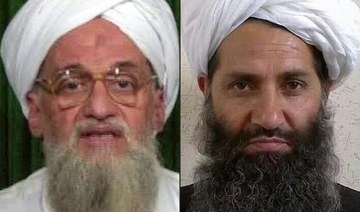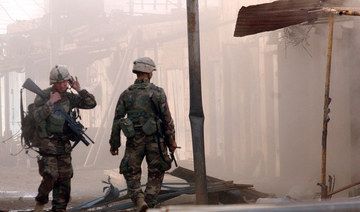LONDON: Governments in Muslim countries and senior Islamic clerics have made great progress in reclaiming Islam from extremists, according to a report published today by the Tony Blair Institute for Global Change (TBI).
Titled “The State of Debate in Islam: Theological Developments in the Muslim World Since 9/11,” it is one in a series from the TBI marking the 20th anniversary of the Sept. 11, 2001 terrorist attacks in the US. It analyzes the effects they have had on the global political landscape and on discussions surrounding Islam.
The report, written by Usama Hasan, a senior analyst for the TBI Extremism Policy Unit and a practicing imam, highlights more than 120 declarations, fatwas and edicts issued by Islamic scholars over the past 20 years in an attempt to confront the threat of extremism, including the 2002 Makkah Declaration.
He also outlines the lively, ongoing debate and discussion in the Muslim world since 9/11, and concludes that the fundamentalist-dominated discussion of Islam of the 20th century is being replaced by a 21st-century narrative that is more progressive, and more open to the world and other religions.
“Despite often going underreported, there has been significant progress over the last 20 years to confront extremist leadership and their destructive perversions of Islam,” Hasan writes.
“Governments, policymakers and decision-makers should take note of the intense ongoing debates in the Muslim world, they should enable and support those voices and forces that are more open, inclusive and universalist. Such forces are durable allies in efforts to build a shared, equitable future for humanity.”
Hasan told Arab News that he welcomes the societal reforms taking place in Saudi Arabia, describing them as “very important and very welcome.” He said he has spoken to a number of Saudis, especially women, who are “delighted” with the reforms being carried out under the directives of Crown Prince Mohammed bin Salman.
But despite the progress that has been made he believes more can be done, not only in terms of dialogue and debate between Muslims but also on the non-Muslim side.
He cites a few rare examples of occasions on which the discussion in the West has reached a high-profile level, including then-US President Barack Obama’s speech to the Muslim world at Cairo’s Al-Azhar University in 2009, and the work of a handful of British ministers with faith leaders. However these kind of things are not happening often enough, according to Hasan.
“I think, certainly from Western governments and from non-Muslim world governments, there should be more outreach,” he said. “Perhaps there hasn’t been enough understanding at governmental levels, in terms of policy.
“I’ve been to a number of international conferences (on the subject) and the outreach from the non-Islamic world tends to come from the interfaith community, where you will have a number of leading interfaith leaders and bodies. But with the decline of religion in western Europe and the US, that often doesn’t filter up to a governmental level.
“With a newly victorious Taliban in Afghanistan, an entrenched Khomeinist regime in Iran, and Al-Qaeda and (Daesh-affiliated) groups around the Muslim world, the struggle between fundamentalists and progressive Muslim voices will continue over the next few decades,” he added.
Regarding the Taliban’s return to power in Afghanistan, Hasan said it is in the best interest of the entire international community, and not only the Muslim world, to engage more with its leadership in an effort to broaden its approach to Islam. He believes the Gulf Cooperation Council can play a wider role in this.
“If the military solution hasn’t worked, the diplomatic, dialogue-based efforts could bear fruit,” he said.
“What I would have liked, in an ideal world, with all of this excellent theological engagement within the Islamic world and the non-Islamic world it would be great to see the Taliban mullahs involved.
“It’s in everybody’s interest to engage more with the Taliban, showing them the sense in having a more progressive, pluralistic approach to Islam.”
While threats from Al-Qaeda and Daesh remain, Hasan said it would be “suicidal” for the Taliban to repeat the hard-line policies imposed during its last stint in power, between 1996 and 2001. And its leadership will be “very keen” to ensure extremist groups do not carry out another large-scale attack on the scale of 9/11, he added.
Hasan’s report also attempts to explain how the fundamentalist, extremist interpretation of Islam functions, using classical Islamic concepts — the ummah, the caliphate, the sharia and jihad — to justify their ambitions.
“Because Islamism is based on knitting together very particular interpretations of these four Quranic terms, mainstream Islam must confront these interpretations head on, especially by emphasizing inclusive and broader understandings of these terms that are more in harmony with the progressive spirit of the modern world,” he writes in the report.
But as long as healthy and constructive debate continues between the Islamic and non-Islamic worlds, Hasan remains optimistic about the future and the role Muslims can play in helping to find practical and lasting solutions to the challenges facing humanity, including climate change and improving human rights.
“I’m an optimist by nature, but I think you have to be realistic as well,” he said. “I think that struggle will continue; developments aren’t without opposition from some quarters.
“But the trajectory shows — and all the indications with globalization, the world opening up and surveys show — young Muslims and young Arabs want it to open up. The forces pushing toward it are strong.
“It won’t be easy but history is on our side, and while there will be sacrifices along the way I’m very optimistic.”














